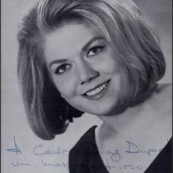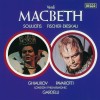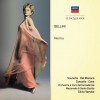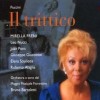| Voice/Instrument: |
Biography
Elena Souliotis (spelled Suliotis in the early part of her career) (28 May 1943 - 4 December 2004) was an operatic soprano initially hailed as "the next Callas." Although her opera recordings were best sellers and she quickly achieved a glamorous and busy career, unwisely, she took on certain demanding roles too early, and damaged her voice by denying it the time it needed to develop and strengthen by natural stages.
Biography
Elena Souliotis was born in Athens, Greece but moved with her family to Argentina at an early age. She studied with Mercedes Llopart, who also taught Renata Scotto, Anna Moffo, Fiorenza Cossotto, Ivo Vinco, Alfredo Kraus, and Francisco Kraus. She made her debut in 1964 as Santuzza in Mascagni's Cavalleria rusticana. She made her United States debut at the Lyric Opera of Chicago during the 1965-66 season as Elena in Boito's Mefistofele; her colleagues in that performance were Renata Tebaldi, Alfredo Kraus and Nicolai Ghiaurov. Other roles that she went on to sing soon afterwards were Luisa Miller, Amelia in Un ballo in maschera and the title role of La Gioconda. A partial list of other operas in which she sang during the first part of her career (1964-1974) include Verdi's Aida and La forza del destino, Donizetti's Anna Bolena, Puccini's Manon Lescaut, Catalani's Loreley, Bellini's La straniera, Zandonai's Francesca da Rimini, and Susanna in Mussorgsky's Khovanshchina. She gave a recital at Carnegie Hall in 1976 and disappeared from the scene shortly after that.
The role for which she is best known is Abigaille in Verdi's opera Nabucco. She made a recording of this role for Decca/London in 1965 and gave an uninhibited performance of the role on opening night of La Scala's 1966-67 season. Within the next couple of years, she also recorded Santuzza and the title role in Norma, the latter in an abridged recording that was much maligned when it was initially released, but which has won a growing following over the years.
A year or two after that, she recorded Donizetti's Anna Bolena (a role she had sung at Carnegie Hall to open its 1967-68 season, and her interpretation of which was largely unchanged by the time she made the recording a few years later) and Verdi's Macbeth, which for a long time appeared to be her swan song to the recording studio. By the time of the latter two recordings, she had changed the spelling of her name from Suliotis to Souliotis. She also recorded arias from Un ballo in maschera, La Gioconda, Luisa Miller, Anna Bolena and Macbeth (the last two before she had recorded the complete operas).
Many sources repeat the inaccurate information that Souliotis made her Metropolitan Opera debut as Lady Macbeth during the 1969-70 season. She was indeed scheduled to make her debut as Lady Macbeth during that season but, because of a strike, the first few months of the season were cancelled. Souliotis never sang at the Met.
She continued to sing the killer role of Abigaille in various venues and the difficulty of this role, which also damaged the voice of Verdi's wife Giuseppina Strepponi, along with the many heavy dramatic soprano roles she had undertaken within five years of her debut, began to take a toll on her voice. She could be in excellent form one night and in near-disastrous form just a few nights later. When she recorded Macbeth, the producers chose to record her versions of "La luce langue" and the Sleepwalking Scene on the same day while she was in excellent form for the period. Evidence from live recordings and the later studio sets show her voice had become rather ragged quite quickly. The power of the instrument remained, indeed that in itself did not really ever disappear, only the beauty of tone and control over pitch were damaged forever, which should probably be expected. Souliotis could probably never match the expectation on her to be the next 'Callas' - the process of emulating the older artist may have been her undoing. We only need to listen to her astonishing Abigaille to realise what went wrong: the forcing of the chest voice upwards, the artificial darkening of the voice to achieve contralto lows and the fierceness of declamation which were too much for a young voice. Yet, in the end, she achieved one of the most astonishing, electric performances on record. What makes the brevity of her main career all the more shocking is when one considers a list of some of her contemporaries and near contemporaries: Ghena Dimitrova, Éva Marton, Jessye Norman, Edita Gruberová, Luciana Serra and Mariella Devia.
After an absence from the stage that lasted several years, she began a second career in comprimario roles beginning in 1979, mostly in Russian operas. She sang Fata Morgana in Sergei Prokofiev's The Love for Three Oranges in Chicago and Florence, and went on to sing in such operas as Prokofiev's The Gambler and Puccini's Suor Angelica, in the latter as the Zia Principessa. Her recording of this latter role in 1991 opposite Mirella Freni turned out to be her true farewell to the recording studio. That recording, like so much of Souliotis' work, is at once powerful and saddening - powerful in that the character comes alive like no other version on disc, shocking and saddening when we step back and realise that Freni was only eight years older than Souliotis at the time of the recording and so much finer in purely vocal terms - a symbol of what could have been had things been different. While her voice was not quite in the shape it was earlier in her career, her personality was as formidable as ever. Toward the end of her career, she had almost a second Abigaille in the role of the Countess in Tchaikovsky's The Queen of Spades and sang this role in several venues, and gave her farewell to the operatic stage in this role in Stuttgart in February 2000.
While she was often criticized during her career and booed in a couple of important productions, her strengths have become more recognized as time has gone on, and she has developed a larger following. Even though she only recorded six of her roles complete, live recordings exist of all or almost all of her roles. The animal intensity she brought to many of her performances has rarely if ever been surpassed.
Mme Souliotis died of heart failure in 2004 in Florence, Italy, aged 61.











